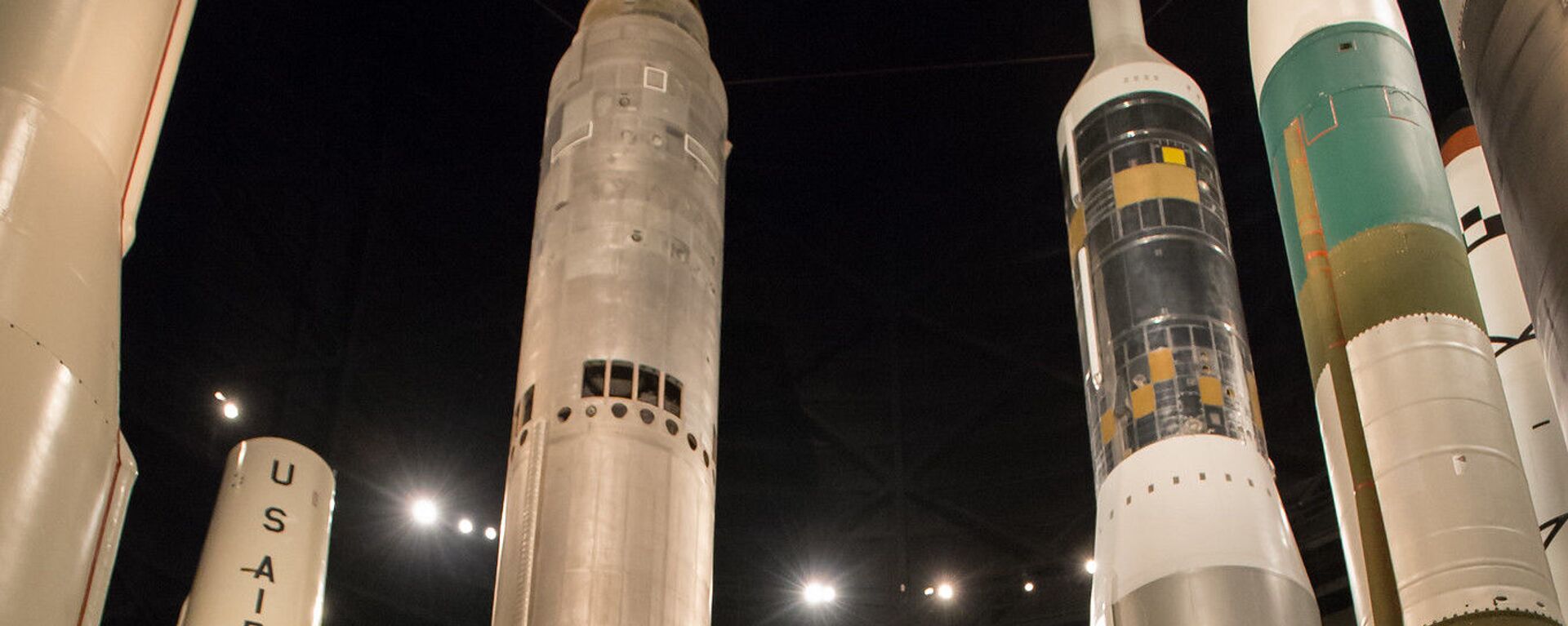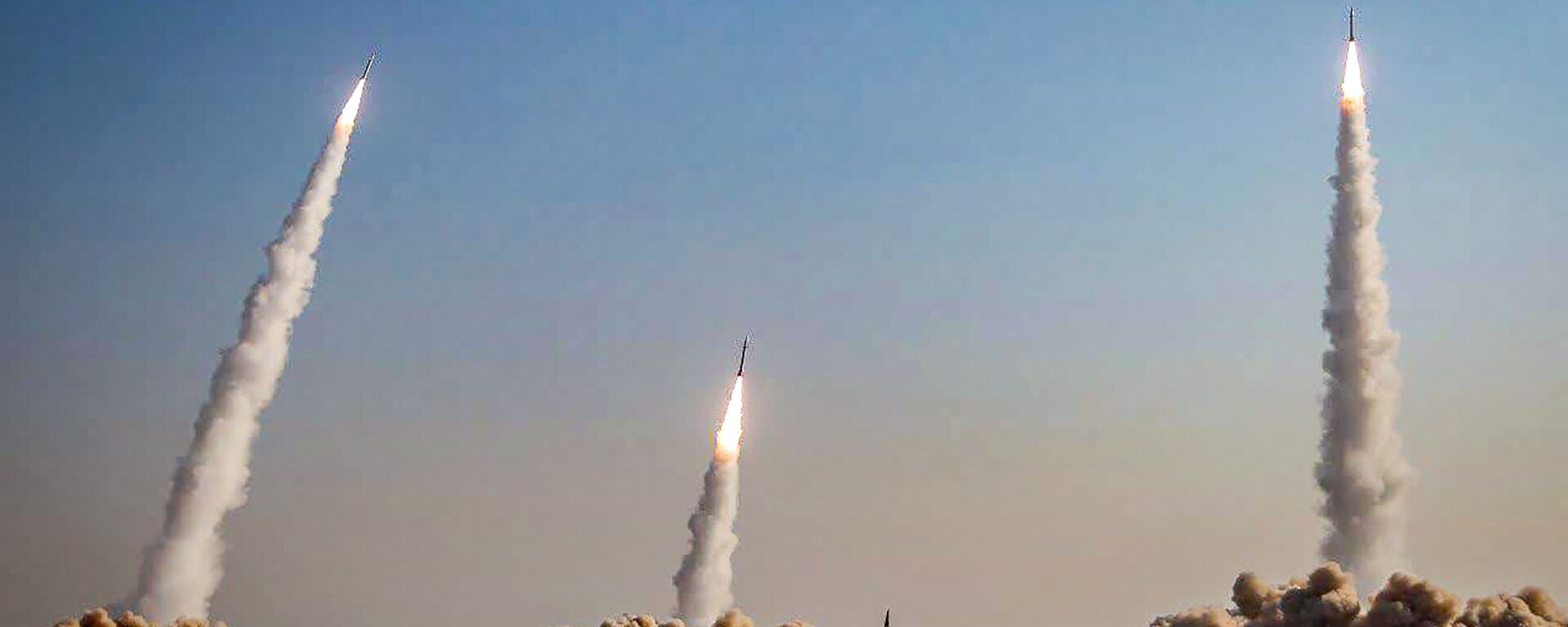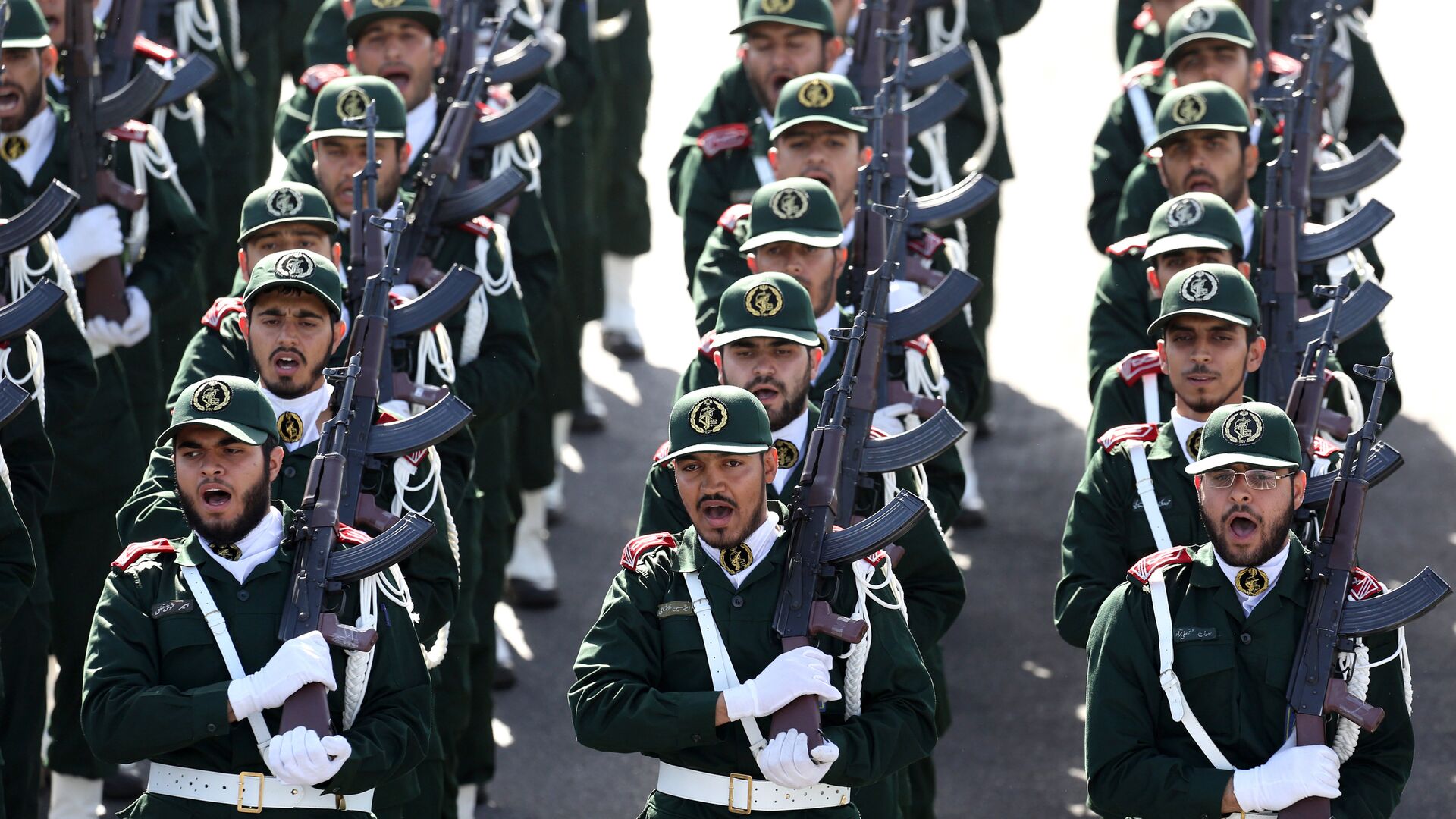https://sputnikglobe.com/20210930/irgc-issues-veiled-warning-to-azerbaijan-says-tehran-wont-tolerate-israeli-presence-near-borders-1089549744.html
IRGC Issues Veiled Warning to Azerbaijan, Says Tehran Won’t Tolerate Israeli Presence Near Borders
IRGC Issues Veiled Warning to Azerbaijan, Says Tehran Won’t Tolerate Israeli Presence Near Borders
Sputnik International
Azerbaijan is one of about a dozen Muslim nations maintaining diplomatic relations with Israel, and the two countries have enjoyed close defence ties since... 30.09.2021, Sputnik International
2021-09-30T13:14+0000
2021-09-30T13:14+0000
2021-09-30T13:26+0000
azerbaijan
israel
iran
https://cdn1.img.sputnikglobe.com/img/107293/70/1072937057_0:209:4001:2459_1920x0_80_0_0_8bfaf434440b0d4019abda29fae95d25.jpg
Tehran will not allow Israel to use the territory of its neighbours as a safe haven for its devious schemes against the Islamic Republic, and neighbouring nations know perfectly well why Iran is forced to hold war games along border areas, a senior Islamic Revolutionary Guard Corps commander has said.Pakpour’s comments follow remarks by Azerbaijani President Ilham Aliyev earlier this week inquiring about why Iran had decided to carry out large-scale drills near the Azerbaijani border. In an interview with Turkey’s Anadolu news agency on Monday, Aliyev called the exercises, which are set to kick off Friday, a “very surprising event” and asking why they were being carried out “now, and why on our border?”Iran offered a big hint regarding the answer to this question by naming the drills ‘Conquerors of Khaybar’, a reference to the 628 CE battle of Khaybar between early Muslims led by the Prophet Muhammad and Jewish tribesmen at an oasis in the northwestern Arabian Peninsula. The battle led to the Jewish tribes’ defeat, and tribesmen were allowed to continue living at the oasis in exchange for payment of tribute to Muhammad.“We expect that the soil of our neighbours not be used as a breeding grounds for the evil deeds of the Zionists. The Islamic Republic expects our neighbours to be a safe and secure environment for other countries and the region,” the commander stressed. He went on to accuse Israel of “helping and supporting” some nations in the region “with the purpose of creating disagreements and rifts among Muslim nations.”Pakpour’s remarks echoed comments by Iranian Foreign Ministry spokesman Saeed Khatibzadeh earlier this week. In a statement Tuesday, Khatibzadeh called the border drills “a question of sovereignty,” and stressed that Tehran would “take all measures it deems necessary for its national security.”The comments out of Iran follow on reports last month that Azerbaijan was in talks with Israel to purchase up to $2 billion in additional weapons and military equipment from Israel, on top of the $7 billion plus Baku has already purchased from the Jewish State since 1992.Rollercoaster RelationsDiplomatic relations between modern-day Iran and Azerbaijan have seen a tendency to swing radically between improvement and deterioration, notwithstanding common historical, cultural and even ethnic ties (ethnic Azeris, living in northwestern Iran near the border with Azerbaijan make up as much as 1/5 of Iran’s population). Relations which enjoyed an upswing in the mid-2000s thanks to improved economic ties and the creation of a joint defence commission faltered after the election of Donald Trump, and Azerbaijan’s decision to support Israel’s claims to Jerusalem after the US moved its embassy there. Baku’s suspension of the oil trade with Tehran in support of US sanctions, allegations by the Islamic Republic that its neighbour sponsors pan-Turkist separatists, and the oil and arms trade between Azerbaijan and Israel, have poisoned relations further. Ties have been further strained by the Turkish invasion of northern Syria in 2019 over Baku’s support for Ankara. Iran has provided support for the Damascus government for nearly a decade, and has demanded that other countries respect Syria's territorial integrity.During the July 2020 Armenian-Azerbaijani clashes, and the September-November clashes in Nagorno-Karabakh the same year, Iran urged restraint, while reporting that several shells, rockets and several unmanned aerial vehicle had fallen onto Iranian territory during the fighting in Karabakh. Israel has sold billions of dollars’ worth of military equipment to Azerbaijan over the past decade, and the country’s military confirmed that Israeli-made attack drones were used extensively during the Karabakh crisis.Warning to IraqIn his remarks Wednesday, Pakpour also warned Baghdad that Iran would target terrorist formations in northern Iraq if the Iraqi government did not expel them. “The officials of Iraq and the Kurdistan Region must evict the elements and members of the terrorist and anti-Revolutionary groups from northern Iraq immediately, otherwise we will destroy their strongholds and bases,” he said.Iran already carried out several missile, artillery and drone attacks into Iraqi territory this month after warning that Tehran would not allow the buildup of militias launching cross-border attacks. In addition to targeting Daesh (ISIS)* and al-Qaeda* in Iraq and Syria, Iran has not hesitated to strike other groups it considers terrorists, including the so-called ‘Kurdistan Free Life Party’ – an Iraqi Kurdish militia group which has staged numerous attacks in Iran’s Kurdistan Province over the years against military and civilian targets. Iranian officials have claimed that the United States supports the militia.
https://sputnikglobe.com/20210929/iran-calls-on-nuclear-powers-to-scrap-their-arsenals-says-disarmament-a-moral-responsibility-1089514483.html
https://sputnikglobe.com/20210727/irans-intelligence-ministry-says-it-has-shattered-mossad-sleeper-cell-plotting-mass-unrest-1083471465.html
https://sputnikglobe.com/20210919/tehran-threatens-to-expand-strikes-against-terrorists-in-northern-iraq-demands-closure-of-us-base-1089211054.html
azerbaijan
israel
iran
Sputnik International
feedback@sputniknews.com
+74956456601
MIA „Rosiya Segodnya“
2021
News
en_EN
Sputnik International
feedback@sputniknews.com
+74956456601
MIA „Rosiya Segodnya“
Sputnik International
feedback@sputniknews.com
+74956456601
MIA „Rosiya Segodnya“
azerbaijan, israel, iran
IRGC Issues Veiled Warning to Azerbaijan, Says Tehran Won’t Tolerate Israeli Presence Near Borders
13:14 GMT 30.09.2021 (Updated: 13:26 GMT 30.09.2021) Azerbaijan is one of about a dozen Muslim nations maintaining diplomatic relations with Israel, and the two countries have enjoyed close defence ties since 2012, when Tel Aviv agreed to sell Baku $1.6 billion in drones and air defence systems. The drones were used in the month-and-a-half-long war in Armenian militia-controlled Karabakh last year.
Tehran will not allow Israel to use the territory of its neighbours as a safe haven for its devious schemes against the Islamic Republic, and neighbouring nations know perfectly well why Iran is forced to hold war games along border areas, a senior Islamic Revolutionary Guard Corps commander has said.
“We cannot accept some countries, under the influence of third countries, making unrealistic and provocative statements regarding the readiness of the combat forces of the Islamic Republic, and undermining our actions,” IRGC Ground Force commander Mohammad Pakpour said, speaking to reporters in Sanandaj, western Iran on Wednesday. “Neighbouring governments are aware better than anyone else of the reasons for Iran’s war games,” he suggested.
Pakpour’s comments follow remarks by Azerbaijani President Ilham Aliyev earlier this week inquiring about why Iran had decided to carry out large-scale drills near the Azerbaijani border. In an interview with Turkey’s Anadolu news agency on Monday, Aliyev called the exercises, which are set to kick off Friday, a “very surprising event” and asking why they were being carried out “now, and why on our border?”
Iran offered a big hint regarding the answer to this question by naming the drills ‘Conquerors of Khaybar’, a reference to the 628 CE battle of Khaybar between early Muslims led by the Prophet Muhammad and Jewish tribesmen at an oasis in the northwestern Arabian Peninsula. The battle led to the Jewish tribes’ defeat, and tribesmen were allowed to continue living at the oasis in exchange for payment of tribute to Muhammad.
Tehran, Pakpour warned, would not tolerate the territories of neighbouring countries turning into “a safe haven and a base for the presence and anti-security activities of the fake Zionist regime.”
“We expect that the soil of our neighbours not be used as a breeding grounds for the evil deeds of the Zionists. The Islamic Republic expects our neighbours to be a safe and secure environment for other countries and the region,” the commander stressed. He went on to accuse Israel of “helping and supporting” some nations in the region “with the purpose of creating disagreements and rifts among Muslim nations.”
Pakpour’s remarks echoed comments by Iranian Foreign Ministry spokesman Saeed Khatibzadeh earlier this week. In a statement Tuesday, Khatibzadeh called the border drills “a question of sovereignty,” and stressed that Tehran would “take all measures it deems necessary for its national security.”
The comments out of Iran follow on reports last month that Azerbaijan was in talks with Israel to purchase up to
$2 billion in additional weapons and military equipment from Israel, on top of the $7 billion plus Baku has already purchased from the Jewish State since 1992.

29 September 2021, 11:02 GMT
Diplomatic relations between modern-day Iran and Azerbaijan have seen a tendency to swing radically between improvement and deterioration, notwithstanding common historical, cultural and even ethnic ties (ethnic Azeris, living in northwestern Iran near the border with Azerbaijan make up as much as 1/5 of Iran’s population). Relations which enjoyed an upswing in the mid-2000s thanks to improved economic ties and the creation of a joint defence commission faltered after the election of Donald Trump, and Azerbaijan’s decision to support Israel’s claims to Jerusalem after the US moved its embassy there. Baku’s suspension of the oil trade with Tehran in support of US sanctions, allegations by the Islamic Republic that its neighbour sponsors pan-Turkist separatists, and the oil and arms trade between Azerbaijan and Israel, have poisoned relations further. Ties have been further strained by the Turkish invasion of northern Syria in 2019 over Baku’s support for Ankara. Iran has provided support for the Damascus government for nearly a decade, and has demanded that other countries respect Syria's territorial integrity.
During the July 2020 Armenian-Azerbaijani clashes, and the September-November clashes in Nagorno-Karabakh the same year, Iran urged restraint, while reporting that several shells, rockets and several unmanned aerial vehicle had fallen onto Iranian territory during the fighting in Karabakh. Israel has sold billions of dollars’ worth of military equipment to Azerbaijan over the past decade, and the country’s military confirmed that Israeli-made attack drones were used extensively during the Karabakh crisis.
In his remarks Wednesday, Pakpour also warned Baghdad that Iran would target terrorist formations in northern Iraq if the Iraqi government did not expel them. “The officials of Iraq and the Kurdistan Region must evict the elements and members of the terrorist and anti-Revolutionary groups from northern Iraq immediately, otherwise we will destroy their strongholds and bases,” he
said.
Iran already carried out several missile, artillery and drone attacks into Iraqi territory
this month after warning that Tehran would not allow the buildup of militias launching cross-border attacks. In addition to targeting Daesh (ISIS)* and al-Qaeda* in Iraq and Syria, Iran has not hesitated to strike other groups it considers terrorists, including the so-called ‘Kurdistan Free Life Party’ – an Iraqi Kurdish militia group which has staged numerous attacks in Iran’s Kurdistan Province over the years against military and civilian targets. Iranian officials have claimed that the United States supports the militia.

19 September 2021, 12:46 GMT






